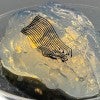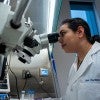
Platform to map living brain noninvasively takes next big step
A technology designed to read gene activity in the brain from a simple blood test has now cleared a major translational hurdle.

Platform to map living brain noninvasively takes next big step
A technology designed to read gene activity in the brain from a simple blood test has now cleared a major translational hurdle.

Rice has launched the Global Brain Economy Initiative.

Rice Brain Institute awards first seed grants to jump-start collaborative brain health research
The Rice Brain Institute has announced the awardees of its first funding initiative, a seed grant program that is a collaborative effort between the university and four institutional partners in the Texas Medical Center.

Why staying focused is harder than ever and what science can tell us about it
From phone notifications and flashing alerts to crowded screens and busy workspaces, modern life is full of visual distractions competing for our attention. A Rice psychologist is investigating how irrelevant visual information interferes with our ability to stay on task and why certain distractions slow us down more than others.

Rice partners on Project Metis to advance global leadership in brain health, emerging brain economy
Rice is a key partner on Project Metis, a groundbreaking initiative led by Center for Houston’s Future to position the Houston-Galveston region as the global leader in brain health and the emerging brain economy.

Materials that match the brain: Rice engineer earns Sontag Foundation distinction
Rice materials scientist and neuroengineer Christina Tringides has been named a Distinguished Scientist by the Sontag Foundation, a national recognition for early career researchers advancing transformative projects in brain cancer research.

A molecular ‘reset button’ for reading the brain through a blood test
Rice bioengineers have designed an erasable serum marker that could enable clinicians to detect problems or measure any changes in how a patient responds to treatment with greater precision, using simple, minimally-invasive testing.

Rice establishes Amyloid Research Center to tackle neurodegenerative diseases
Rice has launched the Amyloid Mechanism and Disease Center, a new campus hub dedicated to uncovering the molecular origins of Alzheimer’s, Parkinson’s and other amyloid-related diseases.

Rice and Paris Brain Institute form transatlantic partnership in brain science and innovation
The partnership follows the recent launch of the Rice Brain Institute, a universitywide effort to accelerate discoveries in brain science and health.

Nonsurgical treatment shows promise for targeted seizure control
Rice bioengineers have demonstrated a nonsurgical way to quiet a seizure-relevant brain circuit using a method that merges ultrasound, gene therapy and chemogenetics.

Rice and Houston Methodist researchers to study brain-implant interface with Dunn Foundation award
A team of researchers from Rice and the Houston Methodist Research Institute has received a John S. Dunn Foundation Collaborative Research Award through the Gulf Coast Consortia to study how the brain responds over time to neural implants.

Rice launches Brain Institute to accelerate discoveries in brain science and health
Rice has announced the creation of the Rice Brain Institute, an ambitious, interdisciplinary hub that unites faculty members across campus, including engineering, natural sciences and social sciences, to tackle one of humanity’s most complex and promising frontiers: the brain.

Algorithm maps genetic connection between Alzheimer’s and specific neurons
Rice researchers and collaborators developed a computational tool that can help identify which specific types of cells in the body are genetically linked to complex human traits and diseases, including in forms of dementia such as Alzheimer’s and Parkinson’s.

Rice study reveals Parkinson’s protein clumps rob brain cells of vital energy
A new study has revealed that protein clumps associated with Parkinson’s can actively drain energy from brain cells.

Rice, Houston Methodist developing soft ‘sleep cap’ to advance dementia prevention research
Rice researchers are working with physician scientists at Houston Methodist to develop a soft, wearable “sleep cap” designed to measure and improve deep sleep, a process critical for protecting the brain against dementia and related diseases.